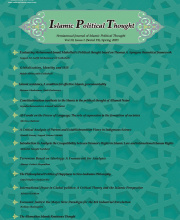۱.
کلید واژه ها:
Imam Khomeini Foreign policy Islamic jurisprudence Islam Iran
Imam Khomeini’s political thought as the architect of the Islamic revolution had a great influence on the formation of the Islamic Republic of Iran’s foreign policy. What exists of his political thought also, is not out of the framework determined by Islam, a great part of which can be discussed within Shiites canon law. The main question in the present research is about the religious foundations of Imam’s political thought, the most important of which consists of “denial of domination of unbelievers upon believers”, “the principle of convocation to jihad”, “the principle of religious esteem”, and “commitment to international treaties” which will be discussed in this research.
۲.
کلید واژه ها:
Islam Liberalism Skepticism Fear Rights
Skepticism and fear caused serious flaws in liberalism. Skepticism made liberalism resort to reason as an Archimedean point for resolving disagreements. But reason like opinions and affections is subject to social contingencies. Liberal fear of human nature has led it to a negative notion of rights that is harmful to social solidarity. Islam can help liberalism resolve these problems
۳.
کلید واژه ها:
Political Science Islamic Iran secularism Power Benefit
The expression of the reality that there is a relationship between the political system and the knowledge type in all societies that contributes to the establishment and continuity of power, guides us to discuss the ideal political knowledge in Iran, appropriate to the Islamic strategic teachings. In other words, Islam has its own requirements impacting all scientific realms including political science. From this viewpoint, the major question is: “What is the strategic requirement of Islam in political realm”? To answer this question, the researcher has tried, using the comparative method, to clarify the differences between the Islamic policy and the secular policy, and then to suggest a new political model. This new model is under the influence of the Islamic teachings from four aspects, namely: first ontological aspect which compares the two-dimensional Islamic viewpoint with the one-dimensional viewpoint of secularism; second, epistemology that compares the software approach of Iranian culture with the hostile one; third, providence that considers salvation as a substitute for hegemonism; and forth, methodology that suggests morality as an alternate for instrumentalism.
۴.
کلید واژه ها:
Islamic Awakening the USA Middle East Islam Foreign policy
The Islamic awakening evolutions in the Middle East have changed the regional discipline in different aspects and affected the policies of regional and trans-regional actors since 2011. Meanwhile, the USA, which defined widespread interest in the region since the Second World War, encountered with the worst crisis than any other state. The present study investigated the USA interests in the Middle East and tested the effects of Islamic awakening on these interests. The main question of this study was the interaction and strategy of the USA in the Middle East for Islamic awakening. The result of this study indicated that the USA has put the measures such as direct military intervention and apparent changes in the ruling elite on its agenda to manage the military presence in the region and target countries, avoid reliance on one union, promote the secular Islamist model, have proximity to civil society and Islamists in the region, strengthen the human rights discourse and advance the process of reconciliation, and manage the challenges posed by the rise of Islamic awakening in the region in the long term.
